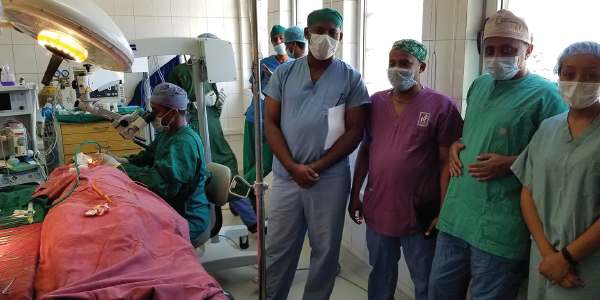Every Fourth of July, my family used to read aloud the Declaration of Independence. I still read it to myself each year. The United States affords us otologists/neurotologists great benefits; from our levels of public health, accessible education, and political infrastructure to the abundance of opportunities in our profession, we are really a charmed group. The quality of our academic efforts and the fineness of our internecine disputes only serve to emphasize the remarkable level at which we function. Additionally, our country remains the academic and entrepreneurial standard for the world and, as American otologists/neurotologists, we have a lot to share with the world.
Explore This Issue
August 2019Over the past few years I have tagged along with a collection of experienced American otolaryngologists who travel frequently to Ethiopia to perform operations on Ethiopian citizens or to teach Ethiopian physicians how to perform these operations themselves. These intrepid academics face frequent setbacks and enjoy some successes as they try to apply American Board of Otolaryngology–Head and Neck Surgery (ABO-HNS)standards to their activities overseas.
Recently, my own role has been to try to formalize the otology and audiology training processes by helping the Ethiopian professionals designate reliable training sites, reliable operative and procedural protocols, and verifiable and attainable curricula. My academic home in the U.S. has been supportive, allowing time away, a salary adjustment to lighten the blow of my time away, and use of the administrative resources of the university. However, my salary and savings have borne the brunt of the expenses for all this capacity building; it’s as if I bought myself a racehorse or a Maserati.
American Traits
As this Fourth of July passes, I would like to outline the particularly American traits and attitudes that have been the strengths of Ethiopian capacity building. The most essential—but somehow least important—is our wealth. We American otologists/neurotologists (even the least remunerated among us) are wealthier than most of the people in the rest of the world. In fact, we are fantastically so. We can afford our plane tickets to Africa or elsewhere. We can afford alligators or duckbills on eBay. We have access to way more money than any Ethiopian physician. And money is an essential tool for transmitting competence.

Ethiopian otologists and otology fellows at Black Lion Hospital in Addis Ababa. (L–R) Dr. Muluken Bekele operating, Dr. Asnake Bitew, Dr. Endalkachew Kibret, Dr. Nebiat Teferi, and Dr. Bilen Korra.
© Courtesy Miram Redleaf, MD
The second trait is our American otolaryngology education. It is exemplary. No matter what you may have thought about your medical school or residency, a few weeks abroad will show you that the United States ACGME and the ABO-HNS are doing something right. Spending time with hard-working, intelligent, motivated Ethiopian medical students and otolaryngology residents will show you that those traits are simply not enough. It takes much more than this to develop surgeons who can recognize a clinical scenario and know what to do next. Our system of early exposure to patient care with an insistence on essential involvement seems to create the otolaryngologist whom you would allow to treat your family member. As otologists/neurotologists, we have to export this model of exposing trainees to accurate evaluation and management.
But by far the most important American trait, which I believe to be the foundation of our wealth and our expertise, is the American attitude that This Difficult Task Is Possible. We are accustomed to things working out—not immediately, and not every time, and not without a lot of effort, but we expect that we can make things work. If I have taught anything in Ethiopia, it is this attitude. The trainees have been surprised to see that there can be a plan based on available resources, we can follow the plan, and it can basically work out. The plan can be their otology curriculum, or constructing a clinically useful research effort, or seeing an original article through to publication.